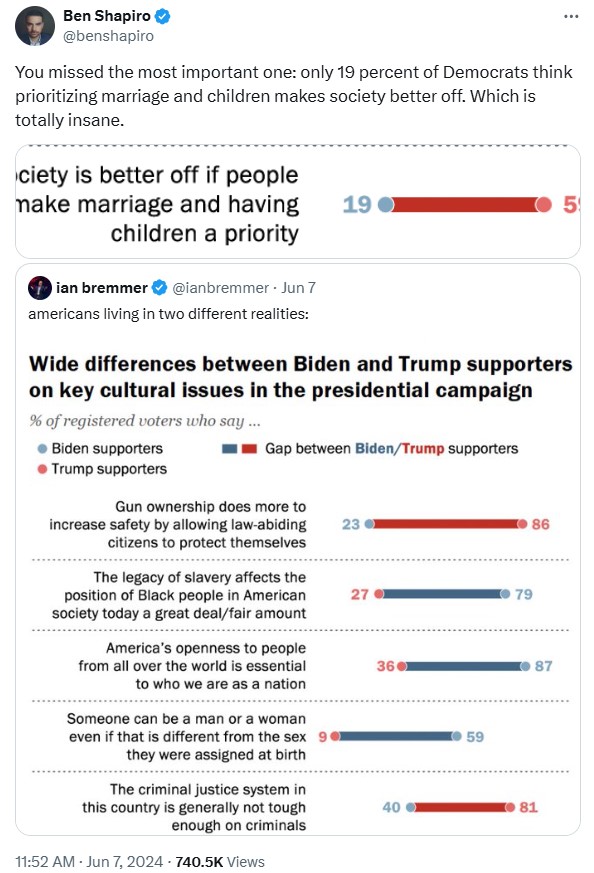I’ve been railing for years against the public policy inclination coming down from the state Department of Education to have schools actively lie to parents about their children’s expressed gender identity. Social media can sometimes give the impression that the tide is turning, and it may be, but we should expect progressive strongholds in Rhode…
A theme one picks up from podcast discussions with cognitive scientists is that much of our perception — what we understand as real — is a matter of our choices about what we don’t pay attention to. A fully capable human has five senses, all of which are constantly sending more data to the nervous…
The New York “justice” system may or may not jail Donald Trump, but the impression Democrat partisans are giving is that the entire charade of a trial was meant primarily to produce the label, “convicted felon.” This marketing ploy, as Roger Kimball notes, may not be working: “It’s my sense that the effort to weaponize…
We’re getting strong reminders, lately, that a free society with mutual respect for rights is vulnerable to those who have no such respect and don’t much like freedom. Among the most-stark examples I’ve seen is this incident, in which pro-Hamas Columbia activists encircle and bodily remove a student who objected to their destroying a campus…
The recent spate of campus demonstrations supporting the anti-Semitic terrorist group Hamas returned attention to something I’m not aware of having seen since the Occupy Wall Street days: the activist “mic check.” Among Leftist organizers, this practice is offered as a humanistic means of amplifying a speaker’s voice without equipment. The person who has the…
Many people would likely see it as an obscure topic reported in a minor venue, but Christian Winthrop’s recent article in The Newport Buzz about the Federal Trade Commission’s (FTC’s) move against noncompete agreements hits three distinct notes that fire me up. The first is that it is unambiguous propaganda: In a landmark decision aimed…
Civility and compassion are important traits we should, as a society, strive to inculcate in our children and uphold ourselves. However, big-state nannyism has reached the point that well-meaning people no longer appreciate the distinction between how we should act as responsible people and what we should be forced or forbidden to do by an…
And they’re both artificial thresholds created by interventionist policies. realEstateTrent makes a great point, here: Progressive policies, which shift decision-making to the blunt tool of government, create these unhealthy thresholds everywhere. People stay on the public dole because they’d have to earn so much money for a job to be worthwhile that no job…
Catching up on email, I came across this October article from the American Stewards of Liberty about a federal push for conservation areas: The Service is planning to acquire 250,000 acres of private land in the new federally designated area by offering “voluntary” conservation easements in perpetuity to landowners. Those who do not want to…
The featured image of this post compares the original cover of Mountain Music by the band Alabama with the censored version now used for music streaming services. I should specify that I’m not alleging the band and the companies that manage its music were forced to make the change by a government agency, but censorship it…
The short answer is that we shouldn’t, but Bill Bartholomew’s attempt is worth a double-take and some thought about what he’s missing: at nearly 68k, Scott Avedisian’s termination payment is almost as much as the contract that the most exciting player in college basketball, Caitlin Clark, signed after being selected first overall in the WNBA draft…
Somehow, despite ample reason for civic disappointment, I find I’m becoming less cynical as I get older, not more. Even now, when I come across reasoning like that expressed by young progressive Democrat Representative David Morales, I can’t help but feel hope that we can salvage reason from the flames of ideology: Here’s the reality:…
The point can’t be stressed enough that Rhode Islanders should understand the Washington Bridge debacle as a representative lesson on our state government. For that reason, not the least, Mark Patinkin’s conversations with local affected business owners is an article to print and review periodically in the future. Restauranteurs and venue owners bought and built…
Arguably, Eric Abbenante— overstates the degree of “debate” in this clip featuring Dr. Phil and Bill Maher, but the difference in point of view he highlights is the crucial one. Here’s Abbenante: Bill Maher and Dr Phil debate the importance of family and religion: “You think family and faith are a big fix to the…

It’s amazing how quickly things are moving. Watching the news media conspire with the Democrat Party literally to deny facts about Kamala Harris and disappear them from the Internet makes Martin Gurri’s two-week-old musings on the Joe Biden coverup look tame:
With Biden, the establishment was presented with a difficult challenge: It was reality itself that needed fixing. The president, we have seen, is an inarticulate speaker, has a bizarre personality, is notoriously thin-skinned and lacks humor and charm as a public person. Furthermore, his administration has been responsible for one disaster after another, at home and abroad. All that had to be fixed. The fictional replica of Biden required an equally fictional—and magnificent—record of achievement.
In an effort that has to be unparalleled in our history, every American institution, from the prestige press to the digital platforms, from academia to the entertainment world and very much including the federal bureaucracy, was recruited to portray President Biden as the second coming of Abraham Lincoln. He was said to be caring, empathetic, a totally normal Everyday Joe who bonded easily with racial minorities—but also serious about his duties, the dignified adult in the room, a reliable ally who would never be manipulated by Vladimir Putin. His administration had defeated the pandemic, saved the economy, embraced migrants of all races, ended a forever war in Afghanistan and somehow protected Ukraine, Israel and Hamas simultaneously. As for the president’s age, he was old but wise, sharp in private though a stutterer in public and surrounded by the best and brightest in any case.
After Biden’s disastrous debate performance, I suggested on social media that the Democrat powerbrokers were evaluating just how far they were willing to go, and they subsequently decided. They’ll go all the way. They’ll destroy everything to remain in power. They can’t go back.
Hard to believe it was 16 years ago America elected Barack Obama to the presidency. In office, he did, indeed, usher in a revolution in American politics and society, and 16 years is many years of people coming of age without really knowing what things were like before the event. Cynical Publius tells the truth:
In 2008 America was as close as it would ever be to stamping out its original sin of racism. American brotherhood and sisterhood without regard for race was in sight. It had been a long, hard slog, but we could see the finish line.
Then Barack Obama got elected and he set out, quite deliberately and with malice aforethought, to drive racial wedges in our society at every turn. Why? Because Democrats gain and maintain power by pitting identity groups against each other. Obama knew this and he set back race relations to the 1970s. It was a crime–maybe not a legal crime, but surely a moral crime.
American has not yet recovered, in large part because Obama’s Fascist Democrat devotees truly learned the power of divisiveness.
Divisive, racialist ideas had been cultivated on American campuses, and the Obama years set the virus loose, setting race relations back decades for electoral gain. Such a shameful organization is the Democrat Party. One can only hope history will be wise enough to look back unkindly on its followers.
Several examples from the history of the last century — with particular clarity in the Spanish Revolution and the rise of Nationalist Francisco Franco — follow a pattern. Communists made inroads and proved themselves to be such immoral, disruptive radicals that even fascists seemed preferable to ordinary people.
Modern Democrats in the United States know themselves to be engaged in a Communist revolution. They know themselves to be imposing radical change by any means necessary, regardless of the preferences of the electorate. And so they expect a populist fascist to be the result.
But the Trump Era differs in two important ways. First, as in so much else, America is exceptional, in the strict sense that it is an exception to historical rules. Just as our “conservatives” want to conserve classic liberalism, our populists want to return to representative democracy and individual freedom.
Second, Communism has metastasized, merging socialism and fascism to run the table for totalitarianism. The radicals absorbed the fascists, and there is no opposing totalitarianism. All that remains is the victory of either Democrat totalitarians or the ippsupporters of freedom.
When Elorza was mayor, it seemed embarrassing for him to take a public event as an opportunity to confront McKee, but his recent comments about public education in Providence, which formed the basis for the confrontation, suggest his emotions were well placed and genuine:
“What we have now is a system that locks in place the status quo, and with [educational] performance being so bad, the status quo is just indefensible,” he says. “There are frankly very few reforms in education that have provided game-changing results, and charter schools have done that in some places.”
Elorza is not to blame for the failure of the state to turn the schools around after a shocking Johns Hopkins report led to the state take-over. Failure was predictable the moment Education Commissioner Angelica Infante-Green arrived with the attitude of working with the teachers union. She should have begun building bonds with parents and the community as a counterweight to the paid activists. She didn’t, and the rest is history.
While the news cycle has definitely moved on from Michaels’s explanation of how crazy California has become, it’s worth pausing for an observation. By her own admission, she is and remains progressive. She’ll play along with a child’s gender dysphoria, for example, even if she thinks puberty blockers and schools’ lying to parents is beyond what should be acceptable.
The problem is her progressivism — progressivism generally — has no inherent stopping point. Michaels’s lingering common sense from a more-sane era is nice, but it’s quickly fading. So, progressives like her may move somewhere else and only vote for the level of radicalism they like, but that will bring the radicalism to which they object.
A few weeks ago, Republican state representative and candidate for U.S. Senate, Patricia Morgan, came under the local media searchlight for some errors in campaign finance.
I don’t see anything particularly suspicious in the findings, but the story does give me an opportunity to restate my thoughts on campaign finance law. It’s just a way to trip up outsiders. We’re to the point that running for office nearly requires finding an outside accountant. A candidate running for multiple offices can’t mix the funds or use them to offset the personal burden of running for office.
Most telling, in this case, is that two people exceeded the maximum donation to Morgan, but the real problem is that her campaign didn’t attribute the donations to the donors and their spouses, which would have been just fine. Consider this error in contrast with the supposedly non-political money that Democrat Senator Lou DiPalma has been getting from a wealthy Newport developer.
Special interests can give politician high-paying jobs, even setting them up for life with income and perks that won’t all have to be made public, but a motivated citizen can’t just give a candidate $6,000 to help her or him run for office, even if it’s reported. This is a system designed to help the corrupt, not to increase transparency.
I’ll start with two arising from Ian Donnis’s recent article about the state’s approval of the sale of two hospitals “to an Atlanta-based nonprofit with no experience in managing hospitals.”
The first question arises from the description of the institutions as “cash-strapped safety-net hospitals.” Rhode Island, among all states, dove right into the centralizing forces of Obamacare and spent hundreds of millions on the Unified Health Infrastructure Project (UHIP). Why are we still having problems with our hospital system? Perhaps the government interventions failed so badly they made things worse? Worth looking into.
The second question is more about political assumptions. Consider this from the agreement:
“To mitigate poor management practices in the past by distant and self-interested owners, the board of the New CharterCARE System must adopt specific best governance practices, include local and community input, and may not alienate, encumber, or pledge New CharterCARE System’s assets without notice to and approval by the Attorney General.”
Why does the State of Rhode Island assume the attorney general is an expert on “best governance practices” in the healthcare industry? I could see his office reviewing for conformity with the law, but business and health decisions? Are we supposed to simply accept that lawyers are really smart people with the highest integrity, and therefore Neronha should be a key decision-maker?
I wonder if this mentality is another indication that our massive tangle of laws is changing how we think. Too many of our business, finance, and personal decisions hinge on what the law permits and requires, so we’ve reached the point that we think lawyers must know what we should do, not just our actions’ relation to law.
Which is: Why is our system not producing the type of leaders we need?
With Governor Daniel McKee, Rhode Island is getting a distilled lesson in our nation’s problem in D.C. At the same time his administration is signing a contract to pay a premium to dismantle the Washington Bridge quickly, he can’t find a company to rebuild it and admits to having no idea of the timeline or the cost. He’s not up to the job of governor.
In fairness to Rhode Islanders for making him their governor, we seem to have slender choices for all statewide and national elective offices. Turning nationally, the occupant of the White House is plainly and obviously not up for the job. I’d opine that Biden’s level of intelligence and integrity has never in his life qualified him to be President, but at this point, there is no question, and there was none in 2020.
On the other side of the aisle, while Donald Trump’s long business career certainly gives him the necessary managerial experience, his behavior is inarguably not what we should want in our national leader. Here, in fairness to Americans for electing him (hopefully twice), the political establishment had become so irresponsive (indeed, hostile) to the electorate and those who would represent them that it required a cartoonish personality to take the job.
So, back to the fundamental question: Why is our system not producing the type of leaders we need? I’d suggest that we’re trying to process too many social decisions through government, which pushes tremendous power and wealth through a tiny orifice. A system of grift has developed such that industries’ worth of special interests see elections as a fight for survival and respond like parasites to corrective treatments.
But we shouldn’t start with my conclusion. At the moment, it would be enough for Rhode Islanders and, more broadly, Americans to start discussing the question. I may be wrong, and shifting the debate from partisan snipes to structural debate would be a step toward healing.
I don’t want to make too much of it, but something seems off to me about Bill Bartholomew’s crusade against Providence businesses’ commandeering parking spaces to use for use in their valet parking service. (I assume that means they’re the spaces right in front of the businesses, allowing cars to pull in and then be parked by valets.) Previously, Bartholomew has tweeted about removing the cones and parking in the spots.
The off part is that, despite pretentions to being a journalist, he didn’t ask the businesses what they are doing and why. He went to the mayor’s office to ask about laws and fines. The impression is that he sees the business owners as “the Man,” abusing the system for their own profit, so they’re targets, not members of the community trying to resolve challenges as they play their part building the vibrant city that everybody claims to want.
The peculiarity is that this seems like it ought to be a solvable problem. A busy restaurant that holds a spot for valet processing may very well increase the amount of parking available. A restaurant, for example, efficiently packs dozens of cars in small lots for its patrons, who would otherwise park on the street or (more likely) just stop going into the city for dinner. That’s a gain all around. But for the sacrifice of that one spot per restaurant, the parking situation in the area would be multiples worse.
If the concern is that the city isn’t realizing revenue from the use of the spot, then the solution is a process for applying and paying for special use at particular times. I suspect the reality is the city has managed this matter using enforcement discretion up to now, and putting an actual system in place would probably be preferably.
Whether it ought to be a top priority just because Bill Bartholomew is annoyed is another question.
Democrat Speaker of the House Joseph Shekarchi made an interesting statement in passing on a recent episode of WPRI’s Newsmakers. The spectacle of the state’s top political official instructing a journalist about how to lobby is worth noting, but this is the particular comment I mean, immediately after the speaker referenced the Access to Public Records Act (APRA) being “abused”:
A lot of private companies use this APRA request to get information, repackage it, and sell it.
I’ve reached out to the House’s spokesman last week to for more specifics about what Shekarchi meant but have received no response. He could mean sites like Anchor Rising that create data visualization tools to better inform the public, or he could mean something even more commercial and specific to certain industries. In either case, I have to ask: How is this abuse?
If there’s money to be made from public information, that’s evidence it has value, and if a private company is able to find information and present it in a way for which others are willing to pay, that simply means that more people are benefiting from the transparency.
The explanation is worth a read in full:
Maybe you’re not convinced. Perhaps you’re inclined to agree with former U.S. ambassador to Russia Michael McFaul, who tweeted in May, “Hamas has nothing in common at all with liberal or progressive values.” If you think he has a point, look more closely at those protesting in sympathy with Hamas. You’ll find every color in the identity rainbow. Black Lives Matter, LGBTQ groups, intersectional feminist organizations, and others salute October 7 as righteous resistance and condemn the Israeli response as genocide. If you still find it strange that people nominally committed to the defense of minorities, women, and the transgendered are supporting a racist, male-supremacist, anti-gay terrorist regime, you’ve missed the purpose of social justice: to “finally shake off this noxious ruling order all together.” This necessarily means destroying the Jewish state, laying waste to the U.S. as we know it, and deifying the enemies of both.
As the saying goes, the issue is never the issue. The revolution is always the issue. These groups unite comfortably in hatred of you and a wish to dominate you and everything you’ve built.
I suspect if we let it come to it, the jihadists will defeat the wokesters, but we shouldn’t let it come to that just to find out.
This tweet reminds us, incidentally, that it makes a difference where inflation enters the economy, particularly in whom it benefits:
If inflation results from an increase in the monetary supply, there’s more money floating around for the same goods and services, and the benefit tilts from the top down (starting with investor types), and effect is everywhere money is spent. If a reduced workforce means businesses have to pay more to attract workers, they have to charge customers more for products that utilize low-skilled labor, and workers with more money will tolerate higher prices on the goods they buy.
Who benefits in the latter scenario isn’t obvious, but the distinction raises two points worth considering. First, big-government politicians seem to prefer that everything be top-down, including reaping the benefits of their policies. And second, it’s insane to expect human beings to manage these things as if they’re turning knobs on a control board.
I’ve been mystified by young(er) adults’ absolute panic about “climate change” in the face of actual experience and the extended timelines of real problems, if they were real. Then I recently watched The Day After Tomorrow for the first time, and I wondered how huge an impact that movie (and the myriad lesser copies that have no doubt permeated our society for decades) had.
The fundamental premise is that climate scientists are wrong not in their warnings of danger, but in their comforts that we have years, decades, or centuries to adapt and prepare. The movie invents a mechanism that brings calamity to half the planet within a month, and in the nature of propaganda, it doesn’t matter how thin the explanation is. It only matters that people suspend their disbelief sufficiently to let the images into their minds. A new ice age not only changes from feeling in conflict with “global warming” to feeling — somehow — connected to it, and slowly creeping glaciers are replaced with the prospect of burning books in the local library for warmth next week.
As George MF Washington writes in The Pipeline:
“The Day After Tomorrow” came along at a critical time for the environmental movement. The propaganda value of the term “Global Warming” had begun to fail. The planet simply wasn’t getting hot enough fast enough, and folks who were still capable of critical thinking had begun to look askance at things like the “hockey stick” graph. The climate movement was desperate to incorporate extreme weather events into its campaign in order to ratchet up the fear factor, but regular Americans just couldn’t wrap their brains around the idea that extreme cold, hurricanes and tornadoes could be created by the same phenomenon that was supposed to be making the Earth hotter and raising sea levels.
The movie feels like an alien invasion film, but its political utility has us sacrificing our economic well-being on a crusade similar, in its response, to building giant space lasers because an invasion could actually come any day.
I appreciate Ken Block’s intellect and civic engagement, but his political commentary leaves much to be desired. Consider this, from the end of a long recent tweet:
I cannot imagine either of these candidates effectively dealing with a crisis, commanding the situation room, keeping the complexities of a crisis fully in their heads, ready to interact with other world leaders who have far better mental capabilities than our candidates do at this point.
What the heck are we doing? Partisan nonsense has left us with no candidate for those who want to elect a leader in this next election.
Note the implicit progressive, technocratic belief that there exist people who can keep all the complexities that go into presidential decision-making fully in their heads, and that international relations is a battle of intellect. It is a common (and dangerous) trap for smart people to think that reason rules reality.
We’d do better to think of elected representatives as avatars of the people. We don’t want a benevolent dictator who can absorb and process every detail as in the classic Saturday Night Live skit of President Reagan as a mastermind. We want people who will react as we would in a given situation, preferably more often than not as we would on our best days.
We’re in our current predicament because the expert class increasingly refuses to accept the desires and interests of the rest of us.
Because progressives have driven conversations about taxes for much of the last century, our thinking is all askew. Characteristic of their approach is to focus on who is giving and receiving the money. This isn’t surprising, because like Karl Marx in their personal life, they’re obsessed with other people giving them money, but it generates the sense that momentary identities are decisive, like immutable states that aren’t affected by behavior and changing circumstances.
(Naturally, progressives will move people into different categories when it suits them. We’re really observing, here, a simplicity of mind.)
Taxes are structural within a system. They are meant to pay for those activities the system requires but for which it will not generate revenue if it’s not built in. Therefore, the question ought to be what is generating money and what are government’s legitimate claims of contributing to having an in those revenue streams.
How it affects the system to take taxes out in a certain way or place is of course a consideration, but I’d argue it should be secondary. To make it primary is to cede the conceit of experts who can make decisions that have no effect on decision-making itself. In other words, choosing to tax X rather than Y because X has less of an observable effect on the natural operation of the economy establishes that the decision should be based on the experts’ judgment, not on something intrinsic within the system, such as the fundamental alignment of, say, government with the real estate that sets its boundaries.
Maybe some Millennials are too young to remember, but the ability of government school students to wear whatever t-shirts they wanted was once a major theme in the mainstream media. These days, we’re learning that it’s highly dependent on the message of the shirt:
In 2023, the seventh grader at John T. Nichols Middle School was told he could not wear a shirt to class with the phrase “There Are Only Two Genders” printed on the front, as it was in violation of the school’s dress code. …
According to the school’s dress code, “clothing must not state, imply, or depict hate speech or imagery that target[s] groups based on race, ethnicity, gender, sexual orientation, gender identity, religious affiliation, or any other classification.” Carolyn Lyons, superintendent of the Middleboro Public Schools System, explained to the student’s father that the shirt in question “was understood to ‘target students of a protected class; names in the area of gender identity.’”
This was always the obvious end-game of “hate speech” rules. Once you can ban speech based on the subjective interpretation that it is “hateful,” all that remains is to define criticism of your beliefs as “hate.”
People of integrity who believe in civil rights and freedom should be done playing these games.
Jordan Peterson has this right, but the darkness of the fact needs to be emphasized:
We’ve been seeing teens charged with felonies for riding over these sections of road disrespectfully, even as Hamas supporters get away with defacing statues. It’s obvious we’re being demanded to treat these symbols with reverence, as if they’re the state religion, but this religion has an important, tyrannical difference.
I wouldn’t want an image of our Lord painted on the street precisely because it couldn’t do otherwise than be defaced. These people paint their sacred symbols on the road explicitly so that they can force people to treat them gingerly. They even put up cameras to keep a watch for transgressors.
In keeping with the notion of “pride” as a high virtue to be celebrated, the purpose is to be in your face while making you take off your shoes and bow down. This is the deepest form of tyranny.
I’ve been pondering Joe Biden’s stated belief that Americans have no standing to complain about illegal immigrants’ raping American women because we rape our own brothers and sisters in the home. It’s tempting to hope he’s just a rambling old man who can no longer construct coherent thoughts (whatever that might mean for the fact that he’s also in charge of the most powerful government in human history), but recalling this recent poll, I’m not so sure he isn’t representative of his party:
The thing is, even rambling old men tend to stay within the boundaries of what they think constitutes a reasonable point for their audience. Whether they’re responding to their own dysfunctional experience or the false reality into which they’ve been indoctrinated, Democrats have become the antifamily party. Many disagree, no doubt, and many more will change with the wind of social change, but that’s a defining theme of the party.
Faced with a movement that is so self-hating and intrinsically destructive of a healthy society, Americans should wipe them out, politically, from the top of the ballot to the bottom.
What a silly cartoon this is:
If the position for which they’re selecting involves climbing, then this exam is dead on. Ignoring context and purpose for the sake of identity-group parity is a DEI sleight of hand.
Consider two general principles of political theory while reading this:
1) Government starts by telling the people how much money it needs and then proceeds to collect it, not the other way around.
2) The less competitive political races are, the more incentive those who are predictably elected have to spend money on corruption and return to ask for more for the basic services that affect everyday life.
This ad for Rhode Island’s CollegeBound Saver fund promotion looks like a sleazy investment ad because it is:
Around $22 million in administrative fees from the program go to the private companies that handle the money and the state. This isn’t necessarily corruption, per se, but we can put it in the questionable bucket of non-governmental activities in which our state government engages.
When the government is involved as a player in a market, citizens have reason to question whether its policies across the board are less focused on the general welfare than on the government’s offering or the health of the markets in which it’s dabbling. A healthy democracy requires clarity of roles, and such programs obscure them.
Politics This Week: The One Area of Democrat Coordination
John DePetro and Justin Katz discuss the areas in which state and national Democrats are able to succeed.
Politics This Week: The Biggest Coverup in U.S. History
John DePetro and Justin Katz trace the political ripples of a rapidly declining Biden.
Washington Bridge: Full Investigation Now
In mid-March, the day after his administration announced that a full replacement, not just repair, of the Washington Bridge would be needed, Governor Dan McKee promised accountability and the day of reckoning for those who are responsible for the position we’re in … further promising to hold any responsible parties fully accountable. even if that…
RI politicians shouldn’t be able to stroll past protecting the butchers of children.
Rhode Island’s governor and Democrat legislators are willing to trample the rights and bodies of children in order to protect medical butchers from facing consequences for their actions.
Politics This Week: Living in Dementia America
John DePetro and Justin Katz discuss the perilous position of the country and state.
Politics This Week: The Biggest Coverup in U.S. History
John DePetro and Justin Katz trace the political ripples of a rapidly declining Biden.
Washington Bridge: Full Investigation Now
In mid-March, the day after his administration announced that a full replacement, not just repair, of the Washington Bridge would be needed, Governor Dan McKee promised accountability and the day…
RI politicians shouldn’t be able to stroll past protecting the butchers of children.
Rhode Island’s governor and Democrat legislators are willing to trample the rights and bodies of children in order to protect medical butchers from facing consequences for their actions.
Politics This Week: Living in Dementia America
John DePetro and Justin Katz discuss the perilous position of the country and state.
Democrat decision-makers may be asking themselves final questions.
For many, Joe Biden’s debate performance exposed a frightening reality and posed a dreadful question for the decision-makers of his party.
Politics This Week: Special Interest Tug of War
John DePetro and Justin Katz look for the hidden dynamics of local politics.

The explanation is worth a read in full:
Maybe you’re not convinced. Perhaps you’re inclined to agree with former U.S. ambassador to Russia Michael McFaul, who tweeted in May, “Hamas has nothing in common at all with liberal or progressive values.” If you think he has a point, look more closely at those protesting in sympathy with Hamas. You’ll find every color in the identity rainbow. Black Lives Matter, LGBTQ groups, intersectional feminist organizations, and others salute October 7 as righteous resistance and condemn the Israeli response as genocide. If you still find it strange that people nominally committed to the defense of minorities, women, and the transgendered are supporting a racist, male-supremacist, anti-gay terrorist regime, you’ve missed the purpose of social justice: to “finally shake off this noxious ruling order all together.” This necessarily means destroying the Jewish state, laying waste to the U.S. as we know it, and deifying the enemies of both.
As the saying goes, the issue is never the issue. The revolution is always the issue. These groups unite comfortably in hatred of you and a wish to dominate you and everything you’ve built.
I suspect if we let it come to it, the jihadists will defeat the wokesters, but we shouldn’t let it come to that just to find out.
This tweet reminds us, incidentally, that it makes a difference where inflation enters the economy, particularly in whom it benefits:
If inflation results from an increase in the monetary supply, there’s more money floating around for the same goods and services, and the benefit tilts from the top down (starting with investor types), and effect is everywhere money is spent. If a reduced workforce means businesses have to pay more to attract workers, they have to charge customers more for products that utilize low-skilled labor, and workers with more money will tolerate higher prices on the goods they buy.
Who benefits in the latter scenario isn’t obvious, but the distinction raises two points worth considering. First, big-government politicians seem to prefer that everything be top-down, including reaping the benefits of their policies. And second, it’s insane to expect human beings to manage these things as if they’re turning knobs on a control board.
I’ve been mystified by young(er) adults’ absolute panic about “climate change” in the face of actual experience and the extended timelines of real problems, if they were real. Then I recently watched The Day After Tomorrow for the first time, and I wondered how huge an impact that movie (and the myriad lesser copies that have no doubt permeated our society for decades) had.
The fundamental premise is that climate scientists are wrong not in their warnings of danger, but in their comforts that we have years, decades, or centuries to adapt and prepare. The movie invents a mechanism that brings calamity to half the planet within a month, and in the nature of propaganda, it doesn’t matter how thin the explanation is. It only matters that people suspend their disbelief sufficiently to let the images into their minds. A new ice age not only changes from feeling in conflict with “global warming” to feeling — somehow — connected to it, and slowly creeping glaciers are replaced with the prospect of burning books in the local library for warmth next week.
As George MF Washington writes in The Pipeline:
“The Day After Tomorrow” came along at a critical time for the environmental movement. The propaganda value of the term “Global Warming” had begun to fail. The planet simply wasn’t getting hot enough fast enough, and folks who were still capable of critical thinking had begun to look askance at things like the “hockey stick” graph. The climate movement was desperate to incorporate extreme weather events into its campaign in order to ratchet up the fear factor, but regular Americans just couldn’t wrap their brains around the idea that extreme cold, hurricanes and tornadoes could be created by the same phenomenon that was supposed to be making the Earth hotter and raising sea levels.
The movie feels like an alien invasion film, but its political utility has us sacrificing our economic well-being on a crusade similar, in its response, to building giant space lasers because an invasion could actually come any day.
I appreciate Ken Block’s intellect and civic engagement, but his political commentary leaves much to be desired. Consider this, from the end of a long recent tweet:
I cannot imagine either of these candidates effectively dealing with a crisis, commanding the situation room, keeping the complexities of a crisis fully in their heads, ready to interact with other world leaders who have far better mental capabilities than our candidates do at this point.
What the heck are we doing? Partisan nonsense has left us with no candidate for those who want to elect a leader in this next election.
Note the implicit progressive, technocratic belief that there exist people who can keep all the complexities that go into presidential decision-making fully in their heads, and that international relations is a battle of intellect. It is a common (and dangerous) trap for smart people to think that reason rules reality.
We’d do better to think of elected representatives as avatars of the people. We don’t want a benevolent dictator who can absorb and process every detail as in the classic Saturday Night Live skit of President Reagan as a mastermind. We want people who will react as we would in a given situation, preferably more often than not as we would on our best days.
We’re in our current predicament because the expert class increasingly refuses to accept the desires and interests of the rest of us.
Because progressives have driven conversations about taxes for much of the last century, our thinking is all askew. Characteristic of their approach is to focus on who is giving and receiving the money. This isn’t surprising, because like Karl Marx in their personal life, they’re obsessed with other people giving them money, but it generates the sense that momentary identities are decisive, like immutable states that aren’t affected by behavior and changing circumstances.
(Naturally, progressives will move people into different categories when it suits them. We’re really observing, here, a simplicity of mind.)
Taxes are structural within a system. They are meant to pay for those activities the system requires but for which it will not generate revenue if it’s not built in. Therefore, the question ought to be what is generating money and what are government’s legitimate claims of contributing to having an in those revenue streams.
How it affects the system to take taxes out in a certain way or place is of course a consideration, but I’d argue it should be secondary. To make it primary is to cede the conceit of experts who can make decisions that have no effect on decision-making itself. In other words, choosing to tax X rather than Y because X has less of an observable effect on the natural operation of the economy establishes that the decision should be based on the experts’ judgment, not on something intrinsic within the system, such as the fundamental alignment of, say, government with the real estate that sets its boundaries.
































